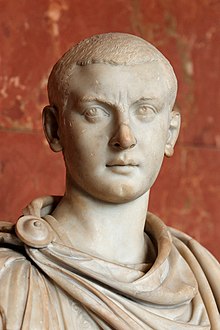
Gordian III (Latin: Marcus Antonius Gordianus Pius Augustus;[1] 20 January 225 AD – 11 February 244 AD) was Roman Emperorfrom 238 AD to 244 AD. At the age of 13, he became the youngest sole legal Roman emperor throughout the existence of the unitedRoman Empire. Gordian was the son of Antonia Gordiana and an unnamed Roman Senator who died before 238. Antonia Gordiana was the daughter of Emperor Gordian I and younger sister of Emperor Gordian II. Very little is known on his early life before his acclamation. Gordian had assumed the name of his maternal grandfather in 238 AD.
In 235, following the murder of Emperor Alexander Severus in Moguntiacum (modern Mainz), the capital of the Roman province Germania Inferior, Maximinus Thrax was acclaimed Emperor. In the following years, there was a growing opposition against Maximinus in the Roman senate and amongst the majority of the population of Rome. In 238 a rebellion broke out in the Africa Province, where Gordian's grandfather and uncle, Gordian I and II, were proclaimed joint emperors. This revolt was suppressed within a month by Cappellianus, governor of Numidia and a loyal supporter of Maximinus Thrax. The elder Gordians died, but public opinion cherished their memory as peace-loving and literate men, victims of Maximinus' oppression.
Meanwhile, Maximinus was on the verge of marching on Rome and the Senate elected Pupienusand Balbinus as joint emperors. These senators were not popular men and the population of Rome was still shocked by the elder Gordian's fate, so that the Senate decided to take the teenager Gordian, rename him Marcus Antonius Gordianus as his grandfather, and raise him to the rank of Caesar and imperial heir. Pupienus and Balbinus defeated Maximinus, mainly due to the defection of several legions, particularly the II Parthica who assassinated Maximinus. But their joint reign was doomed from the start with popular riots, military discontent and an enormous fire that consumed Rome in June 238. On July 29, Pupienus and Balbinus were killed by the Praetorian Guard and Gordian proclaimed sole emperor.
Due to Gordian's age, the imperial government was surrendered to the aristocratic families, who controlled the affairs of Rome through the Senate. In 240, Sabinianus revolted in the African province, but the situation was quickly brought under control. In 241, Gordian was married to Furia Sabinia Tranquillina, daughter of the newly appointed praetorian prefect,Timesitheus. As chief of the Praetorian Guard and father in law of the Emperor, Timesitheus quickly became the de facto ruler of the Roman Empire.
In the 3rd century, the Roman frontiers weakened against the Germanic tribes across the Rhine and Danube, and the Sassanid Empire across the Euphrates increased its own attacks. When the Persians under Shapur I invaded Mesopotamia, the young emperor opened the doors of the Temple of Janus for the last time in Roman history, and sent a large army to the East. The Sassanids were driven back over the Euphrates and defeated in the Battle of Resaena (243).[2] The campaign was a success and Gordian, who had joined the army, was planning an invasion of the enemy's territory, when his father-in-law died in unclear circumstances. Without Timesitheus, the campaign, and the Emperor's security, were at risk.
No comments:
Post a Comment